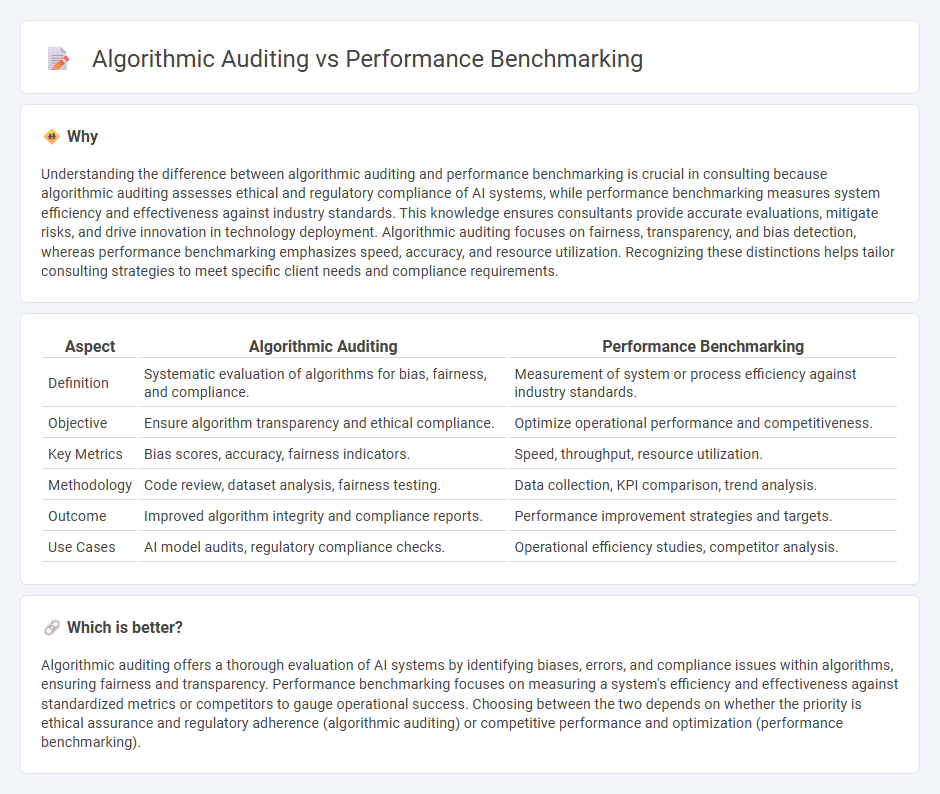
Algorithmic auditing evaluates the fairness, transparency, and compliance of automated systems by systematically examining their decision-making processes and underlying data. Performance benchmarking measures a system's efficiency and effectiveness by comparing key metrics against industry standards or competitors. Discover how combining algorithmic auditing with performance benchmarking can enhance your consulting outcomes.
Why it is important
Understanding the difference between algorithmic auditing and performance benchmarking is crucial in consulting because algorithmic auditing assesses ethical and regulatory compliance of AI systems, while performance benchmarking measures system efficiency and effectiveness against industry standards. This knowledge ensures consultants provide accurate evaluations, mitigate risks, and drive innovation in technology deployment. Algorithmic auditing focuses on fairness, transparency, and bias detection, whereas performance benchmarking emphasizes speed, accuracy, and resource utilization. Recognizing these distinctions helps tailor consulting strategies to meet specific client needs and compliance requirements.
Comparison Table
| Aspect | Algorithmic Auditing | Performance Benchmarking |
|---|---|---|
| Definition | Systematic evaluation of algorithms for bias, fairness, and compliance. | Measurement of system or process efficiency against industry standards. |
| Objective | Ensure algorithm transparency and ethical compliance. | Optimize operational performance and competitiveness. |
| Key Metrics | Bias scores, accuracy, fairness indicators. | Speed, throughput, resource utilization. |
| Methodology | Code review, dataset analysis, fairness testing. | Data collection, KPI comparison, trend analysis. |
| Outcome | Improved algorithm integrity and compliance reports. | Performance improvement strategies and targets. |
| Use Cases | AI model audits, regulatory compliance checks. | Operational efficiency studies, competitor analysis. |
Which is better?
Algorithmic auditing offers a thorough evaluation of AI systems by identifying biases, errors, and compliance issues within algorithms, ensuring fairness and transparency. Performance benchmarking focuses on measuring a system's efficiency and effectiveness against standardized metrics or competitors to gauge operational success. Choosing between the two depends on whether the priority is ethical assurance and regulatory adherence (algorithmic auditing) or competitive performance and optimization (performance benchmarking).
Connection
Algorithmic auditing involves examining algorithms for fairness, accuracy, and compliance, providing essential insights that inform performance benchmarking. Performance benchmarking measures an algorithm's efficiency and effectiveness against industry standards or competing models, relying on audit findings to identify areas for improvement. Together, these processes enhance algorithm transparency, optimize outcomes, and ensure regulatory adherence in consulting projects.
Key Terms
Key Performance Indicators (KPIs)
Performance benchmarking emphasizes measuring Key Performance Indicators (KPIs) such as accuracy, speed, and resource usage to evaluate an algorithm's efficiency against industry standards or competitors. Algorithmic auditing goes beyond KPIs by assessing transparency, fairness, and ethical compliance, identifying potential biases and risk factors in decision-making processes. Explore detailed analyses to understand how each approach impacts the reliability and trustworthiness of AI systems.
Bias Detection
Performance benchmarking evaluates algorithms based on accuracy, speed, and resource efficiency, providing quantitative metrics to compare models under consistent conditions. Algorithmic auditing delves deeper into bias detection by assessing fairness, transparency, and ethical implications through qualitative and quantitative analyses. Discover more about how these approaches ensure equitable AI systems and their impact on ethical machine learning.
Comparative Analysis
Performance benchmarking evaluates algorithms based on metrics like speed, accuracy, and resource consumption to establish efficiency standards across models. Algorithmic auditing assesses fairness, transparency, and bias by examining decision-making processes and data usage to ensure ethical compliance. Explore our detailed comparative analysis to understand these methodologies and their impact on algorithm evaluation.
Source and External Links
What Is benchmarking? How to set a benchmark - Performance benchmarking is the process of evaluating a company's overall performance by comparing specific metrics to competitors or industry standards to identify gaps and improve productivity, efficiency, and profitability systematically.
Performance Benchmarking: Your Quick Guide - Performance benchmarking compares an organization's performance against industry norms or best practices to identify strengths, weaknesses, and areas for targeted improvement with benefits including gaining an independent external perspective.
What are the Four Types of Benchmarking? - Performance benchmarking gathers and compares quantitative data such as KPIs to identify performance gaps and enable continuous improvement and competitive advantage by transforming data into actionable insights.
 dowidth.com
dowidth.com